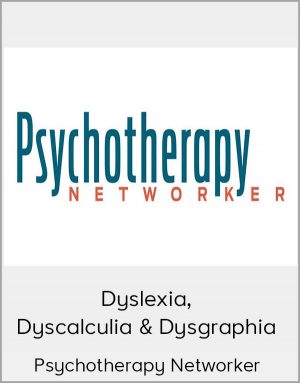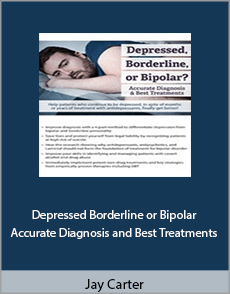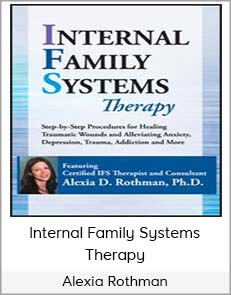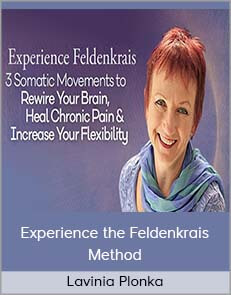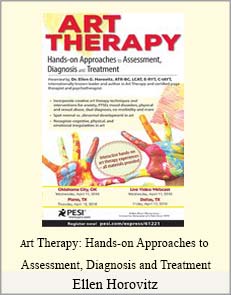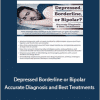Jay Carter – Depressed Borderline or Bipolar – Accurate Diagnosis and Best Treatments
$45.00$219.99 (-80%)
Drawing on empirically tested research and psychodynamic studies, Dr. Carter will discuss the many ways psychotherapists can help patients and families struggling with bipolar disorder.
Jay Carter – Depressed Borderline or Bipolar – Accurate Diagnosis and Best Treatments
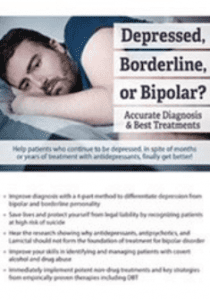
Check it out: Jay Carter – Depressed Borderline or Bipolar – Accurate Diagnosis and Best Treatments
Description
Why is Your Patient Still Unstable & Depressed?
Patients with symptoms of both mood and personality disorders, or with histories of substance abuse, present unique diagnostic and treatment challenges. A recent study by the National Institutes of Mental Health found that nearly 40% of patients with symptoms of major depressive disorder actually had bipolar disorder. These patients are often mistakenly treated for years with antidepressants and non-specific or ineffective forms of psychotherapy or counseling. Antidepressants have been shown to be no more effective than mood stabilizing medications alone for preventing depression in bipolar patients, and can actually destabilize the course of their illness. This recording provides clinicians with a 4-part, clinical diagnostic method to distinguish patients with personality disorders and unipolar depression from those with bipolar disorders.
Drawing on empirically tested research and psychodynamic studies, Dr. Carter will discuss the many ways psychotherapists can help patients and families struggling with bipolar disorder. Learn why antidepressants and atypical antipsychotics should not form the foundation of treatment for bipolar illness. This recording discusses potent, non-drug treatments for depression, mania, and rapid-cycling that can be put to immediate use.
Handouts
Manual – Depressed, Borderline, or Bipolar? (1.46 MB) 36 Pages Available after Purchase
Outline
DEPRESSION: UNIPOLAR OR BIPOLAR? (& WHY IT MATTERS)
- Case study: Suicide and Bipolar Disorder
- 7 cardinal symptoms of hypomania
- Common and often overlooked: mixed depressive and manic states
- Beyond symptoms: markers of bipolar illness
- Family history
- Course of illness
- Response to antidepressants
- Executive functions
BIPOLAR DISORDER, SUBSTANCE ABUSE, & BORDERLINE PERSONALITY
- Is my patient an alcoholic?
- Detecting covert drug abuse
- Increase your patient’s motivation to address addiction
- DSM-5® updates
- Bipolar or borderline?
PSYCHOTHERAPY
- Psychodynamics of euphoric and irritable hypomania
- Overcome lack of motivation and rumination
- 3 evidence-based psychotherapies for bipolar disorder
- Dialectical behavior therapy for bipolar illness
- Helping patients accept the diagnosis of bipolar illness and the need for meds
YOUR WORST FEAR: IDENTIFYING & MANAGING ACUTE SUICIDE RISK
- Predictors of suicide completion
- Risk management
- The only medication proven to dramatically reduce suicide (not an antidepressant!)
POTENT NON-DRUG TREATMENTS FOR MOOD DISORDERS
- Light
- Darkness
- Manipulation of sleep
- Blue blockers
- Fish fat and other natural compounds
MEDICATIONS
- Lamictal is a safe and effective treatment for acute bipolar depression
- Lithium and the other mood stabilizers don’t work in depression
- Depakote: its role in bipolar disorder and comorbid panic and anxiety
- Tegretol: why it’s an underutilized drug, especially for young women
- Lithium: why it’s still the best for many patients
- Depakote: its role in bipolar illness and comorbid panic and anxiety
- Tegretol: why it’s a great, but underutilized drug for young women
- Natural treatments
NOT JUST FOR DOCTORS
- Suboptimal thyroid functioning
Faculty
Jay Carter
PsyD, FPPR (Cand.), DABPS
Jay Carter, PsyD, FPPR (Cand.), DABPS, is a licensed clinical psychologist, a Diplomate Candidate in Psychopharmacology (FPPR cand.), and certified in Psychoactive Substance Abuse Disorders by the American Psychological Association Board of Governors. Dr. Carter has over 20 years of experience working with clientele that include high-risk children, prisoners, and substance abusers. He has testified in local, state, and federal court. Dr. Carter draws his insight from both professional and personal experience. Growing up with a mother who had bipolar disorder equipped Dr. Carter with a wealth of unique insight that has helped him to better understand executive functions and diversity of treatment for others dealing with dysfunction.
Speaker Disclosures:
Financial: Jay Carter maintains a private practice. He receives royalties as an author for McGraw-Hill. Dr. Carter receives a speaking honorarium from PESI, Inc.
Non-financial: Jay Carter is a member of the American Psychological Association.


